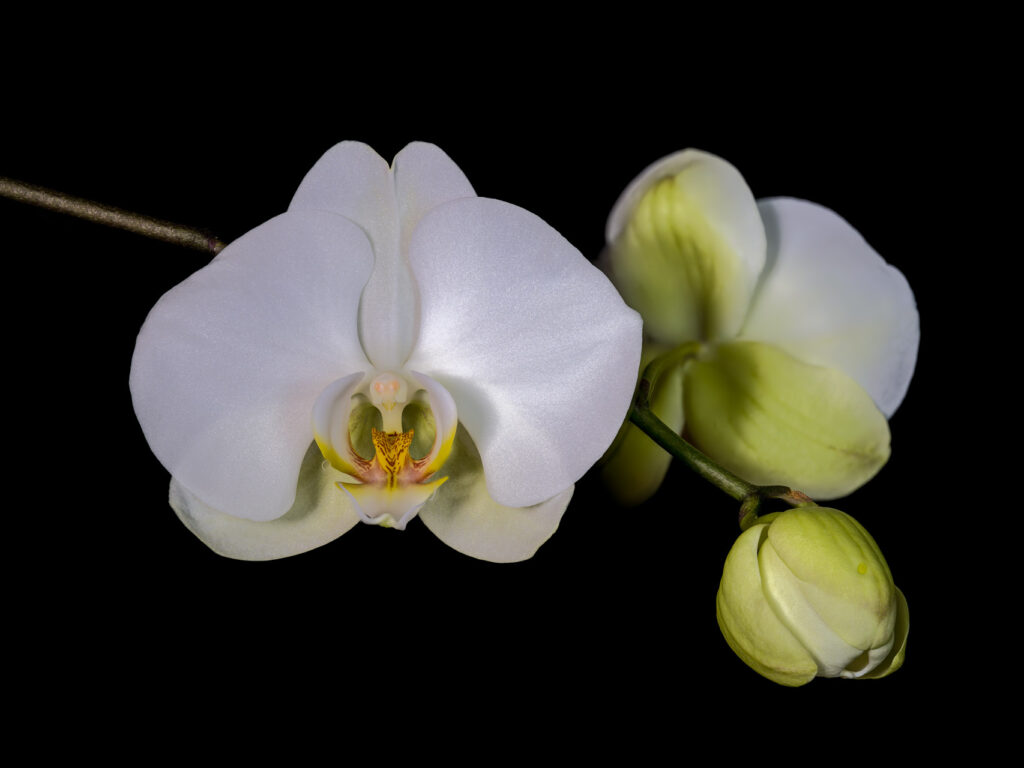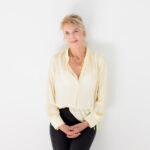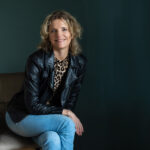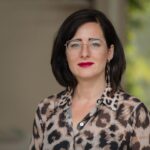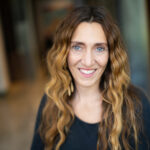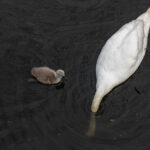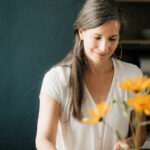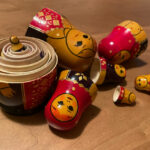“This is such a beautiful thing about a woman’s body: everything is interconnected, nothing works in separation.”
Sara Harris (AUSTRALIA)
Sara Harris from Follow your Flow inspires women to be cycle wise, and provides education, counselling, resources, webinars and workshops on puberty, periods, contraception, fertility awareness, menopause and more. She also supports women who can’t get pregnant, or eventually don’t have children, in a counselling capacity. Recently, Mariette met with Sara Harris (Australia) to discuss the magnificence of the female body, cycles, hormones, pregnancy and parenting. Enjoy!
Mariette: When I tried to get pregnant, around thirteen years ago, eventually with the support of IUI (Intrauterine Insemination), it was the first time I became aware of my ovaries and uterus. I remember seeing them on the ultrasound and being surprised by their actual location. Not once in my life had there been any interest in my female body parts – until I wanted a child. Same with my cycle; it became important around the time I wanted to get pregnant. All those years before that, I had either been on the pill, or not, and never had a genuine interest in, nor a connection with, my cycle, and the fact that I am living 24/7 in a female body. Growing up, we are told that our female parts are for reproduction and our breasts are for breastfeeding. It’s all related to getting/being pregnant and having a child.
Sara: True.
Many women measure their value on their ability to get pregnant and to have a baby. The emphasis and effort that goes into trying to get pregnant is huge.
I’ve seen women bring so much focus on learning about their body when they want a child; learning about when they ovulate, their hormones and cycle, aspects of their body that they’ve never even been interested in before. Like you share, it was never on your radar and by taking the pill, you were busy with suppressing your cycle, as many women do. Or asking… “How can I just disregard it altogether?” But when women want to conceive, they place their value and worth on that, and so, their female parts, hormones and cycles become everything to them. Their life can be consumed by it, so much so, that women go through a huge strain physically, along with financial burden and emotional stress, and will do anything they can to get the outcome they want: a child.
Mariette: There is this sense among women, that when we can’t get pregnant the natural way, that our body is lacking, and therefore we are failing as a woman. Then we expect/demand that a pregnancy will happen through fertility treatments, which is not always the case, without an understanding of how our body works.
Sara: Yes, I see that as well. Why don’t we as women put any focus or emphasis on understanding our body first, before we want to get pregnant? That always kind of baffled me. I work with women who are trying to conceive and have no understanding of their body. This has also been my own experience. I started to get to know my body because of severe period pain and working out why I had so much pain. For me, that was a wakeup call to ask myself: “What is going on in my body?” And also: “What are all these organs in my body and what are my hormones doing?” For other women, that wakeup comes when they try to conceive, and it is not happening. Then they start to bring focus to understanding their body a little bit more. The thing is, they do it for an outcome, because they want a baby. Why don’t we want to understand and get to know our body from a point of love for our body and how our hormones interact with us? Everything is connected. We disregard this relationship with our body, even when it is constantly communicating with us.
Mariette: I can very much relate to this. Firstly, the disregard of everything that my body communicates with me, and how everything is connected. But also, the casualness around having a period, and having female organs. I remember thinking after seeing my ovaries that I had never been aware of them, like I had been aware of for instance my two knees. I saw my ovaries and was like: “Ok, so there you are,” as if they had not been with me since day one. I never had this deep reference, or reverence, for my body, let alone for my uterus, ovaries, ovulation, and breasts. This is not taught, nor is this reflected in the world we are living in.
Sara: Exactly, there is no reference nor true understanding of how our cycle works and how the uterus, the ovaries and the cervix interact with each other. This is such a beautiful thing about a woman’s body: everything is interconnected, nothing works in separation.
We have the uterus and the ovaries responding to hormones constantly and there is this beautiful cycle that happens in the feedback loop that is happening every month. It is such an intimate and intricate process, that it is mind boggling when you really get to know it. It is quite incredible. It blows my mind every time and there is always more to learn about what is actually going on in our body and on a monthly basis for a woman.
When we take a closer look at the uterus, we see that it responds to hormones every month, where the lining of the uterus thickens and becomes really rich. And after that, responding to hormones, it sheds. This is beautiful, a presentation of something that is being held in our body every month. The uterus looks like a chalice, which feels very sacred in our body. But we don’t pay attention to it, because it is not modelled or taught to us. So therefore, we don’t appreciate how it works, and what is taking place in our body.
Mariette: Your interest in your female parts came from heavy periods and mine from the need to have a child. I see a lot of women, both young and older, who experience heavy periods. It seems to have become more of a norm than an exception. I have been teaching girls in a high school and when the topic was about periods, I asked what they had heard about them and about menstruation. Nearly all of them said, “It’s painful, you become moody, you want to eat chocolate, and it is annoying.” We don’t get taught the importance of having an intimate relationship with our body and what our cycle reflects to us about the way we are living.
Sara: I agree. We focus on fixing or numbing the pain or say, “This is just bad luck. Some women get period pain, and others don’t. You just have to deal with it as it is part of being a woman.” But there is so much more to it than that and this is something I have learned over the years. The way I was with myself — that is, the relationship I had with myself — definitely impacted on the way I experienced my menstruation, in my case, the heavy pains. My cycle reflected that relationship. I noticed that if I actually looked after myself differently, and if I didn’t live in a way that was disregarding of my body and I was really listening to myself in terms of my relationship with sleep, or the foods that I ate, that my period was different. When I was experiencing really bad period pain, I began to notice that I had been eating a lot of sugar, and also a lot of inflammatory foods. I was addicted to cereals for breakfast, lunch, and dinner, with lots of milk. This was causing a lot of a lot of inflammation in my body, and it was speaking loudly to me. It became obvious that I was absolutely allergic to milk because I would sneeze and just be so sick. It also impacted my period. Removing those kinds of foods was just one step in actually recognizing that I contribute to what I’m experiencing in my cycle and in my life in so many different ways.
Mariette: Did your cycle change and did you experience less pain when you started to make those changes in your self-care regime?
Sara: Absolutely. Let me first share this with you. The advice I got for the pain, from the doctor — this was in my teen years — was to take the pill. The pain I experienced was severe. I was writhing around on the floor and was not able to move. And so, I did take the contraceptive pill for a number of years. But at some point, it didn’t feel right. I did not feel myself or comfortable in my body while being on the pill. I felt flat and kind of numb and my body felt like it was the wrong shape. I didn’t like taking it, so I stopped. This was the moment for me, when I asked myself, “What is actually going on in my cycle?”
I started to learn about the female body and started to make changes in my foundational self-care, bringing my focus to food, exercise, sleep. I stopped drinking copious amounts of milk and eventually stopped consuming all forms of dairy. I also began to eliminate sugar from my diet. This included reducing alcohol and ensuring that I was getting to bed much earlier. Not surprisingly, my cycle started to shift with the pain starting to change significantly, very much so. And I felt much more connected and sensitive to the subtle changes throughout the month as I moved through each phase. I also stopped looking at period pain as something bad and having no pain as something good.
The relationship I had with myself as a woman went to another level, from having no relationship, to having a relationship with my body and my cycle. It was no longer about what is good or bad, or right or wrong, it became more enriching. It became about what my body was communicating to me and then me responding — so I began having this beautiful interaction with my body instead of ignoring it.
Mariette: I love what you share about the relationship with yourself, which is something that I became aware of when I wanted a child; it was non-existent. I had no idea who I was, felt empty inside and thought that becoming a mother would bring me a fulfilment. I was already identified with being a mother before I got pregnant. And then, I didn’t become a mother and realized: “Should I not first have a relationship with myself before I give birth to a child? If I want something from a child, then is that not something I should give to myself? Should I not first have a foundation of care and love before I conceive a child?”
Sara: What you share is such a great point. I work with women through all stages of the life cycle. So many women have an investment in getting pregnant and having children. We identify with the role of being a mother once we have children and live out that role over many years. And then our children eventually grow up and leave the house, and we eventually move into the stage of menopause — sometimes these events line up and sometimes not, depending on when we have our children. Regardless, our children will become adults and the woman who was invested in being a mother is now at the other end of the ‘fertility’ spectrum and asks herself, “Who am I?” This leads to challenges and struggles on many different levels, and exposes the lack of relationship with oneself, as a woman first and foremost.
Mariette: You are a mother of a son. How has this been for you?
Sara: Well, my son was an unplanned pregnancy. I wasn’t trying to conceive. I wasn’t married, I wasn’t in a relationship, and I was young. I had been in a relationship for six years and after we broke up, I found out that I was pregnant. I decided to go ahead with the pregnancy and became a single mom. I had some very strong ideals and beliefs about pregnancy and motherhood and put them all into this situation I was in. On reflection, I now realise I was in reaction to my own experience of being parented, without bringing understanding, at the time, to the fact that my parents were simply doing their best given their own experiences of being parented, and so forth. I had a lot of investment in doing everything the natural way, like having a natural birth and making sure I was breastfeeding for at least twelve months. I had many pictures of how the pregnancy, giving birth and what parenting would look like. But then nothing went according to plan.
Mariette: Sounds familiar; that often things in life don’t go according to our plan. What happened?
Sara: The birth was an absolute mess; it was chaos. But I won’t go into all details. My son was born six weeks early, and therefore he didn’t have the sucking reflex, so he couldn’t breastfeed. My whole picture of breastfeeding got blown out of the window in an instant. I was pumping milk every three hours, 24 hours a day for over four weeks, which drove me to absolute exhaustion. I kept on trying and my son was distressed. We didn’t have a great start. I was stressed. He felt this, so he was distressed, and it was stressful for those around us.
I had held on to such a strong idea about what kind of mother I was going to be and looking back now, I can see that a relationship with myself was absent. All I was buying into were these pictures about what I thought I had to be, or what motherhood had to look like. I was overriding my sense of what was actually needed in this particular situation; rest for myself and settlement for my son. He was not going to be nurtured through my distress and the breast milk that was coming through that stress. He was going to be nurtured through my support of myself.
We are fed that you get a connection with your child through breastfeeding. This is completely false — you get a connection with your child by having a connection with yourself first.
Mariette: That connection with ourselves, and our body and cycle, is missing for many women, and has been missing for me as well. We don’t honour and appreciate enough that we are in a female body and that this body is an enormous gift, one which always speaks the truth.
Sara: I was listening to someone the other day online, a doctor, who was saying that women really don’t need their periods. You can actually just suppress it your entire fertile life by taking hormones like the pill, because there’s no medical reason to have a period. I was baffled about that, as even if we just look at a period from a physiological function, there’s so much in it and how the hormones are interacting. Having a cycle and having a period has many benefits, and also from the production of estrogen and progesterone, which impact the uterus and the cervix, and the entire cycle. Our cycle and the production of hormones impacts our bone health, our immune health, our heart health, and our mental health. These hormones have an impact on the way we sleep and how we can feel settled.
Progesterone is described as our own anti-anxiety hormone, one that we produce. By taking the pill, we’re suppressing our natural cycle and not getting the benefits of that. And the numbing of the natural cycle has an impact on the connection with our body and the relationship with ourself. In truth, our cycle is intricately designed for us to have a relationship with – not to ignore. Yet, a lot of women really hate having a cycle and their period, which I have found is mostly due to a lack of understanding. And often this is a result of what they hear from other women, as well as messages in the media!
There is no education about this in schools: the fact that as women we live with a cycle.
We should learn much earlier in our life about the magnificence of our bodies, because if not, it can be tricky to connect with that perspective. What I find when I talk to women when they are older, and I share about our cycle and how it works, coming from a place of appreciating the absolute wonder and magic of it all, their jaws just drop and they say, “I had no idea this is happening every month and that my cycle is something to connect to. And that throughout my cycle, my body is communicating something to me.” Many women then feel like they have been missing out.
Mariette: I have learned what you share, also later in life, by the reflection of another woman. I can relate to feeling a sense of missing out, like, “Why has anybody ever told me this? Why is having a period always seen as something negative and something to dismiss?” I had no issue at all with going into menopause, but had to get used for a while, to not have a period anymore. I never had reflected to me that having a cycle is like a gift, something to connect to and appreciate.
Sara: There are very few role models in the world, women who have a connection with their body and have a true understanding of, and appreciation for, the incredible intricacy and magnificence of how their body works.
There are very few women who feel the abundance of being a woman. If we ignore this vital part of who we are, we are missing out on so much. There is a fullness that every woman can connect with, where she knows herself from the inside out – this is a gorgeous, beautiful and rich way to live.
Mariette: I never felt the abundance you describe. And because of that, I did not feel complete, and thought that if I had a child, that abundance would be there. I know many women who have children, yet also don’t feel the abundance.
Sara: Exactly. That’s right. That is the very typical common story, that when women get to menopause, and have children that leave the home, they ask themselves the questions: “Where am I? Who am I?” We have been so identified with being a mother, that we miss out on what mothering can look like when we bring focus to being a woman first – being full first. And if we do, we are a role model for not only all women, but for our kids as well.
A number of years into parenting, everything about the way I was as a parent changed. And consequently, my relationship with my son changed in the most beautiful way. When I was trying my hardest to make our lives fit into a picture, into all the ideals I had bought into, it was really stressful. I realise now that I was anxious most of the time and was imposing expectations onto my son about how he had to be and how we had to be with each other. So, there was an underlying tension that neither of us were enjoying. When I started to drop this and take a few steps inward to start building a relationship with myself, and I started to really nurture and listen to my body, my son couldn’t but also respond. The way we began to connect was beautiful…better than any picture I could have ever conjured up. Absolutely no effort involved!
Mariette: What have you discovered about the female body that you find so magnificent and grand? What have you learned about it?
Sara: Our body is so much more than what we have been taught about its function, in terms of producing a baby, and that our worth is based on our capacity to bring through that result.
In terms of the hormone production, our body is constantly responding to the way we are living. There is not a moment when our cycle is not responding.
So, we have this beautiful communication from our body and if we connect to our body, we can have a relationship with it and our cycle. I love sharing with girls and women about their cycle and the intricacy of the way that it works. Nothing is nothing and nothing is missed. It is so perfectly responsive and therefore, it is worth having a relationship with that. As women, we need to understand how our cycle works physiologically and have an appreciation for the hormones and our organs, and what they do and how they change throughout every month. Just take our ovaries as an example. They are producing follicles every month and they get reabsorbed back into the body when they’re not used. If we don’t appreciate that, then it’s difficult to have a connection with it.
Mariette: You see and speak to a lot of women, including women who want to have a child. What do you observe?
Sara: They come to me, often in a counseling capacity for instance, when they are part of an IVF journey. They can come when they have just come off the pill, and they’re just getting started to conceive. Or they can come, when they’ve had multiple miscarriages, or they have been trying to conceive for quite some time. There are many reasons why a woman comes to see me and to talk through her experiences and the challenges she is facing. Whatever the reason, it always comes back to the relationship with herself as a woman. It is almost like starting from the ground up, and really establishing that relationship.
Whether a woman is trying to conceive or not, my advice is always the same. Start by getting connected to the natural flow of the cycle. Charting your cycle is a great support, so you can really connect with the changes that occur throughout the different phases that tend to move from a certain quality, like an in-breath and then move to an out-breath, and then an in-breath again and an out-breath. Much like the different phases through the day and night, we can also feel this throughout the month. This is a good place to start.
Mariette: You also meet women who eventually don’t have a child, for whatever reason. In the year following my decision to not continue with fertility treatments, I had to settle with the fact that I was not going to have children, and I have had great support with the embracing of that fact. But I have never felt a loss or that my life would be less because I did not have a child. I remember saying to people, “I did not get a child, but I got myself back.” What do you observe when women are at the point that they know it is not going to happen?
Sara: With most women, there’s a feeling of a huge loss, that they experience. And that’s something to process and something to work with and get support for. When we really break it down, the loss that they are experiencing is the projected picture of what the pregnancy or baby was going to give them. It is this ideal that many of us carry. The loss is the ideal, and women are letting go of that projection. Women then have to realize that the only way to feel complete, is to have a relationship with themselves. That is where the fullness comes from. Having a baby is beautiful thing and it can bring lots of things in many ways, but a baby is not the answer to what women are looking for: a completeness. And we are only looking for that completeness because we are fed that we are incomplete without a child, failing to recognise that we were already complete from the start. This can be quite a process, because the picture of becoming a mother and what that brings, is so strong, not only from that certain woman, but globally. It is already there when you are born into a female body, the expectation that comes with that, is you’ve got to be a mom. It is deeply embedded and ingrained and we buy into that picture thinking that is the way it is and should be. And when it is not that, everything crumbles.
Mariette: What I have noticed over the years, is that I love putting my hand on my lower belly where my uterus is. And then one hand on my heart. Although I always thought that the uterus was there for pregnancies, I have learned and have experienced that it supports me to connect with myself.
Sara: I love what you say about putting your hand on your uterus and the other on your heart. Then it is more about what that part of the body vibrationally represents, what it energetically holds, as well as its physiological function. I see women who need to have a hysterectomy, where the uterus and the ovaries are removed. And if that’s the case, that doesn’t make a woman less of a woman. We don’t need to be attached to those organs to be a woman. It’s more so what they vibrationally represent and that never goes anywhere, even if the organs are removed. So, with the uterus, it represents the femaleness of a woman, and the quality of stillness.
Mariette: What have you learned from being a mom? You shared that you have a lot of pictures about motherhood.
Sara: In the past 21 years, I have learned that being a parent is a huge responsibility. And that responsibility comes with me having a relationship with myself first, because that is what then informs me on how to parent. If I don’t have clear boundaries for myself and an authority in understanding who I am as a woman, and the qualities that I bring, then what am I modeling to my son? After all, he is going to have relationships with women in his life.
As I shared, I was very overwhelmed at first with that responsibility and didn’t know what was actually required. I had all these pictures and ideals getting in the way.
After a number of years, I realized I had to let go of that and make the focus about myself, but not in a selfish way, as we tend to get fed. I realized the depth of nurturing and connection that was required for me to actually have a healthy relationship with myself first then my son…and to have fun!
Gosh, I was so serious in the beginning and missed out on really enjoying the beautiful relationship we now have.
✺
